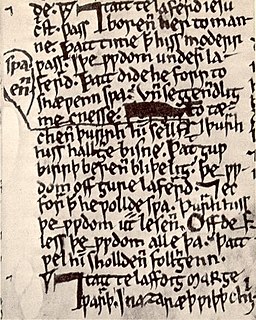
Latin is a classical language belonging to the Italic branch of the Indo-European languages. The Latin alphabet is derived from the Etruscan and Greek alphabets and ultimately from the Phoenician alphabet.
Old English literature or Anglo-Saxon literature, encompasses literature written in Old English, in Anglo-Saxon England from the 7th century to the decades after the Norman Conquest of 1066. "Cædmon's Hymn", composed in the 7th century, according to Bede, is often considered the oldest extant poem in English, whereas the later poem, The Grave is one of the final poems written in Old English, and presents a transitional text between Old and Middle English. The Peterborough Chronicle can also be considered a late-period text, continuing into the 12th century.

Middle English was a form of the English language, spoken after the Norman conquest (1066) until the late 15th century. English underwent distinct variations and developments following the Old English period. Scholarly opinion varies, but the Oxford English Dictionary specifies the period when Middle English was spoken as being from 1150 to 1500. This stage of the development of the English language roughly followed the High to the Late Middle Ages.

Scriptio continua, also known as scriptura continua or scripta continua, is a style of writing without spaces, or other marks between the words or sentences. The form also lacks punctuation, diacritics, or distinguished letter case. In the West, the oldest Greek and Latin inscriptions used word dividers to separate words in sentences; however, Classical Greek and late Classical Latin both employed scriptio continua as the norm.
In punctuation, a word divider is a glyph that separates written words. In languages which use the Latin, Cyrillic, and Arabic alphabets, as well as other scripts of Europe and West Asia, the word divider is a blank space, or whitespace, a convention which is spreading, along with other aspects of European punctuation, to Asia and Africa. However, many languages of East Asia are written without word separation.

The modern English alphabet is a Latin alphabet consisting of 26 letters, each having an upper- and lower-case form. The same letters constitute the ISO basic Latin alphabet. The alphabet's current form originated in about the 7th century from the Latin script. Since then, various letters have been added, or removed, to give the current Modern English alphabet of 26 letters:

The Psychomachia by the Late Antique Latin poet Prudentius, from the early fifth century AD, is probably the first and most influential "pure" medieval allegory, the first in a long tradition of works as diverse as the Romance of the Rose,Everyman, and Piers Plowman.

The Ormulum or Orrmulum is a twelfth-century work of biblical exegesis, written by a monk named Orm and consisting of just under 19,000 lines of early Middle English verse. Because of the unique phonetic orthography adopted by its author, the work preserves many details of English pronunciation existing at a time when the language was in flux after the Norman conquest of England. Consequently, it is invaluable to philologists and historical linguists in tracing the development of the language.

"O Come, All Ye Faithful" is a Christmas carol that has been attributed to various authors, including John Francis Wade (1711–1786), John Reading (1645–1692), King John IV of Portugal (1604–1656), and anonymous monks. The earliest printed version is in a book published by Wade, but the earliest manuscript bears the name of King John IV, and is located in the library of the Ducal Palace of Vila Viçosa. A manuscript by Wade, dating to 1751, is held by Stonyhurst College in Lancashire.

Rustic capitals is an ancient Roman calligraphic script. Because the term is negatively connotated supposing an opposition to the more 'civilized' form of the Roman square capitals, Bernhard Bischoff prefers to call the script canonized capitals.
West Saxon was one of four distinct dialects of Old English. The three others were Kentish, Mercian and Northumbrian. West Saxon was the language of the kingdom of Wessex, and was the basis for successive widely used literary forms of Old English: the Early West Saxon of Alfred the Great's time, and the Late West Saxon of the late 10th and 11th centuries. Due to the Saxons' establishment as a politically dominant force in the Old English period, the West Saxon dialect became one of the strongest dialects in Old English manuscript writing.

In linguistics, Old Dutch or Old Low Franconian is the set of Franconian dialects spoken in the Low Countries during the Early Middle Ages, from around the 5th to the 12th century. Old Dutch is mostly recorded on fragmentary relics, and words have been reconstructed from Middle Dutch and Old Dutch loanwords in French.

A lacuna is a gap in a manuscript, inscription, text, painting, or a musical work. A manuscript, text, or section suffering from gaps is said to be "lacunose" or "lacunulose". Some books intentionally add lacunas to be filled in by the owner, often as a game or to encourage children to create their own stories.

The Mirror of Simple Souls is an early 14th-century work of Christian mysticism by Marguerite Porete dealing with the workings of Divine Love.
Love in this book layeth to souls the touches of his divine works privily hid under dark speech, so that they should taste the deeper draughts of his love and drink. - from 15th-century English translator's prologue.

The Tremulous Hand of Worcester is the name given to a 13th-century scribe of Old English manuscripts with handwriting characterized by large, shaky, leftward leaning figures usually written in light brown ink. He is assumed to have worked in Worcester Priory, because all manuscripts identified as his work have been connected to Worcester.
In Biblical studies, gloss or glossa is an annotation written on margins or within the text of Biblical manuscripts or printed editions of the scriptures. With regard to the Hebrew texts, the glosses chiefly contained explanations of purely verbal difficulties of the text; some of these glosses are of importance for the correct reading or understanding of the original Hebrew, while nearly all have contributed to its uniform transmission since the 11th century. Later on, Christian glosses also contained scriptural commentaries; St. Jerome extensively used glosses in the process of translation of the Latin Vulgate Bible.

The Anglo-Saxon Chronicle is a collection of annals in Old English chronicling the history of the Anglo-Saxons. The original manuscript of the Chronicle was created late in the 9th century, probably in Wessex, during the reign of Alfred the Great. Multiple copies were made of that one original and then distributed to monasteries across England, where they were independently updated. In one case, the Chronicle was still being actively updated in 1154.
Cædmon's "Hymn" is a short Old English poem originally composed by Cædmon, an illiterate cow-herder who was able to sing in honour of God the Creator, using words that he had never heard before. It was composed between 658 and 680 and is the oldest recorded Old English poem, being composed within living memory of the Christianization of Anglo-Saxon England. It is also one of the oldest surviving samples of Germanic alliterative verse.
The Catholicon Anglicum was an English-to-Latin bilingual dictionary compiled in the later 15th century.














